The International Association of Plumbing and Mechanical Officials (IAPMO) was pleased to have participated in the Plumbing and Heating event at WorldSkills Competition 2022 Special Edition (WSC2022SE), Nov. 2-4 at GROHE Technikum in Lahr, Germany. The competition showcased national champions from 20 WorldSkills member countries. IAPMO CEO and World Plumbing Council (WPC) Deputy Chair Dave Read more
heating

 The International Association of Plumbing and Mechanical Officials (IAPMO) was pleased to have participated in the Plumbing and Heating event at WorldSkills Competition 2022 Special Edition (WSC2022SE), Nov. 2-4 at GROHE Technikum in Lahr, Germany. The competition showcased national champions from 20 WorldSkills member countries.
The International Association of Plumbing and Mechanical Officials (IAPMO) was pleased to have participated in the Plumbing and Heating event at WorldSkills Competition 2022 Special Edition (WSC2022SE), Nov. 2-4 at GROHE Technikum in Lahr, Germany. The competition showcased national champions from 20 WorldSkills member countries.
IAPMO CEO and World Plumbing Council (WPC) Deputy Chair Dave Viola relished the opportunity to present medals to the winning champions, concluding a thrilling three-day competition at the celebratory closing ceremony on Saturday, Nov. 5. Viola was joined by IAPMO Chief Administrative Officer and WPC Secretariat Gaby Davis, as well as IAPMO President David Gans and Vice President Steve Panelli, both experiencing a WorldSkills competition for the first time.
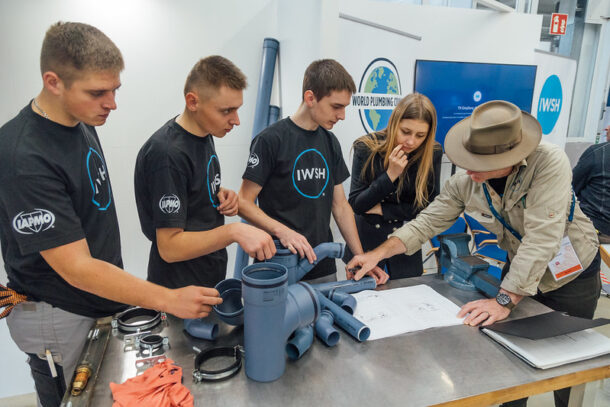
Plumbing and Heating competitor Florian Bliem of Austria captured the gold. Joint silver medals were awarded to Tom Pean of France and Marton Offner of Hungary, and the bronze medal was won by Tai-Yu Chen of Chinese Taipei.
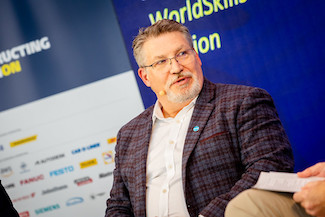
Dave Viola
Indicative of the high standard of this year’s long-awaited, rescheduled competition, six additional entrants were awarded medallions for achieving a final assessment above WorldSkills’ benchmark for excellence: Sangyeop Kim (Korea), Saku Hurtig (Finland), Luca Herzog (Switzerland), Connor Cruden (United Kingdom), Fabian Grün (Germany), and Yuto Itahashi (Japan).
“What we are seeing today at WorldSkills is the best of the best, showcasing their skills and inspiring other people to do their best quality work,” Gans said. “We are looking at the future of plumbing, and plumbers. These are the young men and women who are going to take plumbing to the next level and help change the world.”
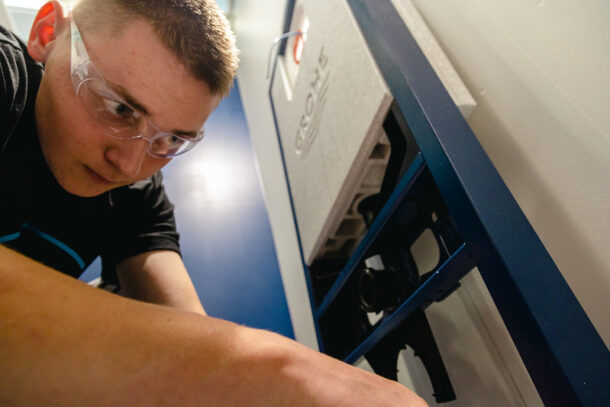
The event also showcased a new Plumbing Champions training activity, sponsored by the World Plumbing Council and delivered by the International Water, Sanitation and Hygiene Foundation (IWSH), charitable arm of The IAPMO Group. Three young students, accompanied by one mentor and one interpreter — all from Ukraine — were sponsored to participate in an educational workshop completing the same test project as was tackled in the WorldSkills competition, guided and supported by technical experts from IAPMO and GROHE.

Mayor of the city of Lahr Markus Ibert paid a special tribute to the Ukrainian group in his closing remarks.
“I would like to thank all participants who made this special event possible, and I wish you all the best for your ongoing life; success, and peace — especially to our guests from Ukraine. To you, to your families and your neighbors, have a good time, in peace, and with benefits, for a good life.”
The biennial WorldSkills international competition returns in September 2024, where it will be hosted in Lyon, France.
For more information about WorldSkills, visit https://worldskills.org/.

Milwaukee Valve has announced the retirement of President and CEO Rick Giannini, effective January 20, 2023. John Labellarte, the company’s current COO, will succeed Giannini in leading the commercial, industrial and marine valve manufacturer. Giannini joined Milwaukee Valve in 1998 and successfully guided the business through challenging market conditions. His leadership transformed Milwaukee Valve into Read more
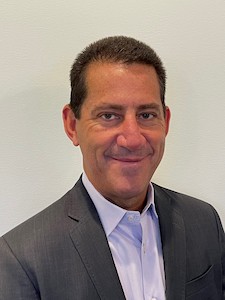
John Lebellarte
Milwaukee Valve has announced the retirement of President and CEO Rick Giannini, effective January 20, 2023. John Labellarte, the company’s current COO, will succeed Giannini in leading the commercial, industrial and marine valve manufacturer.
Giannini joined Milwaukee Valve in 1998 and successfully guided the business through challenging market conditions. His leadership transformed Milwaukee Valve into a service leader and global manufacturer. He guided the transformation of the sales organization, reinvested in manufacturing processes and equipment, and assembled the company’s overseas manufacturing operations. Giannini greatly expanded the development and growth of Milwaukee Valve’s product offering and presence in the Navy Marine market.
Giannini also developed and maintained the management team which will continue to lead the company. He dedicated time and energy to industry-leading organizations, serving as Chairman of the Aircraft Carrier Industrial Base Coalition (ACIBC) since its inception in 2004. He also sat on The American Supply Association’s (ASA) Industrial Piping Division Steering Committee and served on ASA’s Board of Directors.
New president and COO John Labellarte started with Milwaukee Valve in 1999 as General Manager. He was promoted to Vice President and COO in 2006. During his tenure, Labellarte has been instrumental in driving the company’s global manufacturing initiatives, strategic planning, product development and operational performance. His focus on continual improvement and the utilization and development of new technologies will continue to build brand value and value proposition for the company. Prior to joining Milwaukee Valve, Labellarte worked for 12 years with the Marpac & McCANNA Valve companies, serving in operations and management roles. He is extremely qualified to lead Milwaukee Valve, with 35 years of executive and operations management experience in the valve industry.
In its 121st year of business, Milwaukee Valve Company is internationally recognized for state-of-the-art manufacturing facilities and innovative new products covering a wide range of commercial and industrial applications.
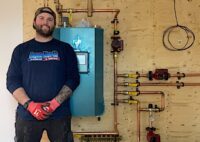
While he’s not busy with his day job working on hydronic heating systems, commercial and residential plumbing, backflow prevention and gas work, Chris Massaro (@nwo_plumber) loves playing guitar and recording music. Admiring the recent tattoo to commemorate his daughter’s birth, “I was in a bunch of bands throughout high school and recorded an album once Read more
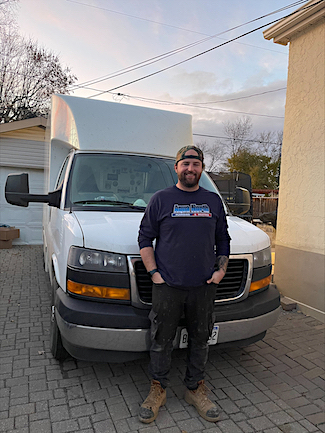 While he’s not busy with his day job working on hydronic heating systems, commercial and residential plumbing, backflow prevention and gas work, Chris Massaro (@nwo_plumber) loves playing guitar and recording music. Admiring the recent tattoo to commemorate his daughter’s birth, “I was in a bunch of bands throughout high school and recorded an album once. I don’t get around to it as much as I used to or like to, but I’m definitely making more time for that now,” says Massaro, owner/lead tech at Aqua North Plumbing and Heating Ltd., Thunder Bay, Ontario, Canada.
While he’s not busy with his day job working on hydronic heating systems, commercial and residential plumbing, backflow prevention and gas work, Chris Massaro (@nwo_plumber) loves playing guitar and recording music. Admiring the recent tattoo to commemorate his daughter’s birth, “I was in a bunch of bands throughout high school and recorded an album once. I don’t get around to it as much as I used to or like to, but I’m definitely making more time for that now,” says Massaro, owner/lead tech at Aqua North Plumbing and Heating Ltd., Thunder Bay, Ontario, Canada.
I take that back. Massaro also enjoys hanging out with friends and family, golfing and mountain biking. And, he definitely needs to get that grill time in—grill, smoke, BBQ. “Sometimes in that order, in one cook. Most of the time I do use the smoker though. I’ve been on a pulled pork kick lately. My favorite is some nice pork shoulders on the Traeger. It’s the ultimate dad activity, in my opinion,” says Massaro.
The work\life balance has been a struggle for Massaro; he realized one day that when you are running your own small business sometimes there isn’t a balance. You have to make the time and prioritize it. “Do what’s important to you and make time for the people and activities you love. And most importantly, take care of yourself! Because you’re worth it. Time stands still for no one so spend it wisely,” says Massaro.
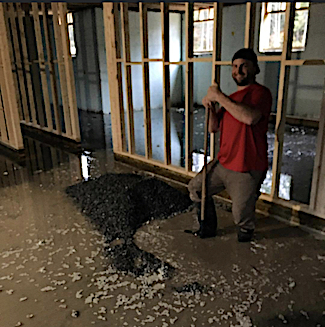 And that’s why staying physically fit and active is important to Massaro. “I’m always lifting, bending, up and down the stairs all day so it’s helpful to have a training regimen that supports that. And, it really helps to keep me in mental shape as well,” say Massaro.
And that’s why staying physically fit and active is important to Massaro. “I’m always lifting, bending, up and down the stairs all day so it’s helpful to have a training regimen that supports that. And, it really helps to keep me in mental shape as well,” say Massaro.
Even more important is eating right, says Massaro. “We use a lot of energy in a day in the trades so we have to keep that fire fed. All of this allows me to stay energized all day and still have plenty of gas in the tank when I get home for family time,” continues Massaro.
Massaro’s foray into the trades started when he starting working for the family business as a plumbing apprentice at the age of 13. “Made best friends with my shovel and we went to work. Thankfully, I graduated from digging trenches and went on to start really learning about the ins and outs of the trade,” recalls Massaro.
Over the next few years, Massaro spent most days plumbing residential systems with a few commercial jobs sprinkled in here and there while working for my father. “It was nice to be doing a bit of everything and not just strictly one area of the trade, which I felt was important to be a well-rounded tech.
Once Massaro had a few years under his belt, he did a lot of remote northern work for fly-in communities. “Those big jobs we did up there really sharpened my time and material management skills,” says Massaro.
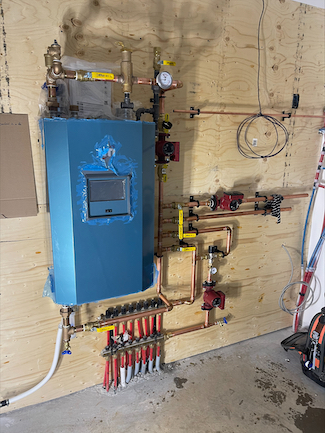 In addition, the high school Massaro attended offered a cooperative education program where he was able to gain work experience hours toward his apprenticeship if he chose to stick with plumbing. “I would go to regular classes for the morning periods then co-op at Aqua North in the afternoon,” says Massaro.
In addition, the high school Massaro attended offered a cooperative education program where he was able to gain work experience hours toward his apprenticeship if he chose to stick with plumbing. “I would go to regular classes for the morning periods then co-op at Aqua North in the afternoon,” says Massaro.
As a side note, Massaro says that if your local high school offers a cooperative education program, he highly recommends getting involved. “It’s a really pressure-free way to get your feet wet in whatever trades the school offers,” says Massaro. “I always try to take on one co-op student per year and leave them with a positive experience in the trade. I feel that’s the best way for kids to feel out what they want to do. And, don’t be afraid to ask questions!”
Next, after getting all of his trade school and work hours complete, Massaro then wrote his exam for his certificate of qualification in plumbing. Shortly thereafter, Massaro bought the family business, and the rest is history.
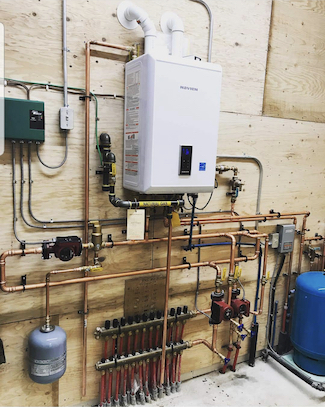 As fourth-generation plumber, Massaro has had some great mentors in his career, with plenty of help and guidance from his father and grandfather in learning new and old ways of plumbing. “If my great grandfather was around then I’m sure he would have some real old school stuff to show me.”
As fourth-generation plumber, Massaro has had some great mentors in his career, with plenty of help and guidance from his father and grandfather in learning new and old ways of plumbing. “If my great grandfather was around then I’m sure he would have some real old school stuff to show me.”
And while Massaro doesn’t consider himself a role model, he’s always willing and ready to help others to do their best at work, and life in general. “I’ve learned a lot over the years and sharing the experiences and knowledge with up-and-coming tradespeople is paramount,” says Massaro.
For Massaro, he loves building something from nothing and executing the job. “Sometimes just sitting back after the job is done and being like ‘damn we really did that.’”
Perception Change
The perception of the industry needs to change, says Massaro. “I think the wheels are turning on that as we speak but we’ve got a long way to go.”
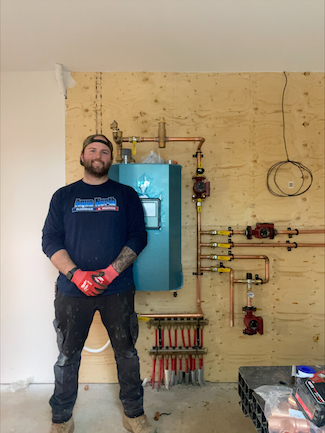 Social media is that vehicle for the instrument of change as it’s an easy way to showcase contractor work, and connect with other professionals. “There’s a solid amount of tradespeople out there doing an amazing job. If we can show people that there’s more to plumbing than just plunging toilets, fixing leaks, and back-breaking work, then I think that’s a win,” says Massaro.
Social media is that vehicle for the instrument of change as it’s an easy way to showcase contractor work, and connect with other professionals. “There’s a solid amount of tradespeople out there doing an amazing job. If we can show people that there’s more to plumbing than just plunging toilets, fixing leaks, and back-breaking work, then I think that’s a win,” says Massaro.
Whether it’s new and better tools, techniques, business knowledge, etc., Massaro has learned so much on social media. “It’s awesome that we can connect with people and have such a great community sharing tricks of the trade, meet-ups or even debate if it’s tape then dope—which it is—or dope then tape,” says Massaro.
In the end, as Massaro sets his sights on his career and further enriching his life, a good bucket list item to check off would be getting a recreational pilot’s license. “Always wanted to get into aviation in some way.”
The sky’s the limit.
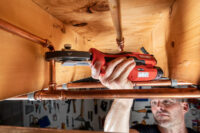
RIDGID, part of Emerson’s professional tools portfolio, introduces the smallest and lightest press tool on the market, the RP 115 Mini Press Tool. Designed for residential and lightweight commercial plumbing use, it completes the majority of press connections installed in the market with ease, while getting professionals to their next job faster. Engineered with the Read more
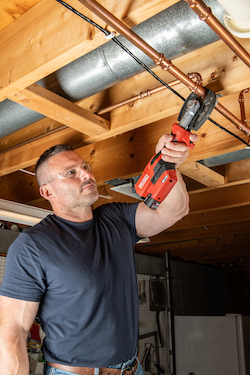 RIDGID, part of Emerson’s professional tools portfolio, introduces the smallest and lightest press tool on the market, the RP 115 Mini Press Tool. Designed for residential and lightweight commercial plumbing use, it completes the majority of press connections installed in the market with ease, while getting professionals to their next job faster.
RIDGID, part of Emerson’s professional tools portfolio, introduces the smallest and lightest press tool on the market, the RP 115 Mini Press Tool. Designed for residential and lightweight commercial plumbing use, it completes the majority of press connections installed in the market with ease, while getting professionals to their next job faster.
Engineered with the quality and technology that have kept RIDGID first in pressing for decades, the RP 115 can press 1/2-inch to 3/4-inch copper and stainless steel fittings. It is 14.6 inches long, 2.5 inches wide and weighs only 5.5 pounds with battery and jaws. The RP 115 has a SlimGrip handle and optimized trigger for balance and control; one-handed jaw opening and operation for reach and ease of use; and 210-degree head swivel for access to tight spaces.
Visit RIDGID.com for more info.

Welcome to another edition of our Hub Spotlight series where do a deep dive into the men and women who make the trades great. This spotlighted tradesperson tells us that he really enjoys trashy reality TV. “Nothing like kicking your feet up and watching someone making horrible life decisions on 90-Day Fiancé on a Sunday Read more
Welcome to another edition of our Hub Spotlight series where do a deep dive into the men and women who make the trades great. This spotlighted tradesperson tells us that he really enjoys trashy reality TV. “Nothing like kicking your feet up and watching someone making horrible life decisions on 90-Day Fiancé on a Sunday evening.” Joking aside, for Keith McGillivary (@mps_207)—full-time business owner of McGillivary’s Plumbing Services (MPS), Gardiner, Maine, for the past two years—his story into the plumbing trades is an interesting one.
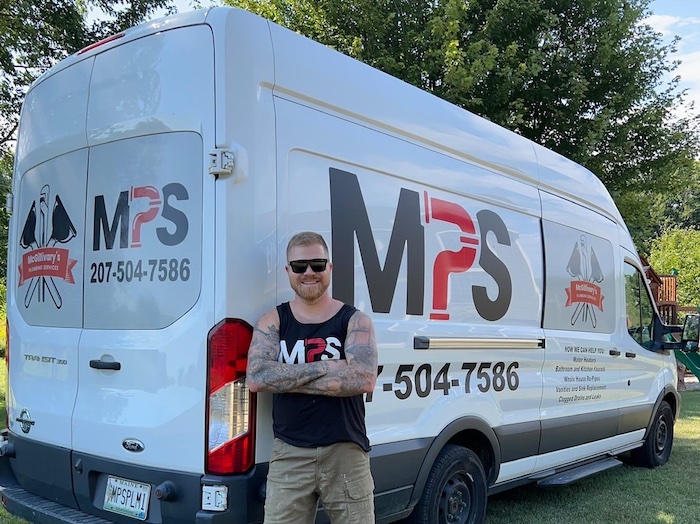
McGilivary’s path started in a small town when a small plumbing business was looking for a helper, and he was looking for a job. “Little did I know it would be the start of where I am now,” says McGillivary. Before college, McGillivary started working for a small plumbing business that primarily focused on service work. The owner, Russell, was/is a great mentor and really took the time to help him understand not only what they were doing, but why they were doing it.
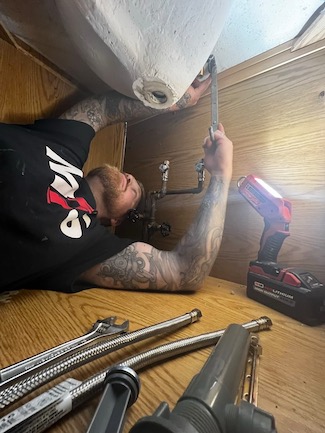 After deciding to pursue plumbing, McGillivary attended Southern Maine Community College (SMCC) for its plumbing and heating program. Through college, he continued to work alongside his mentor, and after graduation, continued to work for him full time for three years. McGillivary then took a job at Bath Iron Works (BIW) as a pipefitter building destroyers, ships for the United States Navy. “The piping systems were complex, and although it was “plumbing on a ship,” it was completely different. I found it fun to learn the ins and outs of that particular plumbing,” says McGillivary.
After deciding to pursue plumbing, McGillivary attended Southern Maine Community College (SMCC) for its plumbing and heating program. Through college, he continued to work alongside his mentor, and after graduation, continued to work for him full time for three years. McGillivary then took a job at Bath Iron Works (BIW) as a pipefitter building destroyers, ships for the United States Navy. “The piping systems were complex, and although it was “plumbing on a ship,” it was completely different. I found it fun to learn the ins and outs of that particular plumbing,” says McGillivary.
Eventually, McGillivary joined the Pipefitter Test Crew and tested the piping systems after they were built. He worked there for six years, but the whole time he continued to work nights and weekends doing plumbing work on the side. “This allowed me to gain hours and knowledge for my Master’s test. After passing my Masters, I decided to make the plunge into self-employment because I wanted the schedule flexibility for my family,” says McGillivary.
 In fact, McGillivary’s biggest motivation for self-employment was time, rather than money. “I have learned to set firm boundaries for myself when scheduling and taking on jobs. I have been able to take more time off for my family than ever. Being a service plumber, in this day in age, you could work 24/7 if you wanted. I try to work ‘normal’ hours, and if I can take a day off for family stuff, I always do,” says McGillivary.
In fact, McGillivary’s biggest motivation for self-employment was time, rather than money. “I have learned to set firm boundaries for myself when scheduling and taking on jobs. I have been able to take more time off for my family than ever. Being a service plumber, in this day in age, you could work 24/7 if you wanted. I try to work ‘normal’ hours, and if I can take a day off for family stuff, I always do,” says McGillivary.
Shout Out to Mentorship
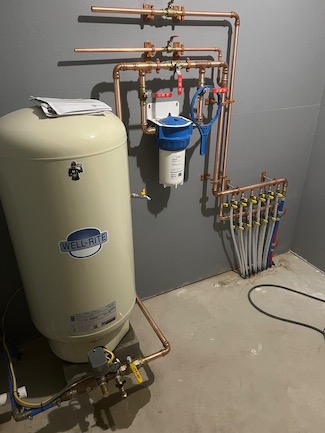 According to McGillivary, Russell taught him everything he knows about plumbing and owning a business. “He taught me all the hands-on work, how to write estimates & bid on jobs, customer relations, and how to balance a small business/family life,” says McGillivary.
According to McGillivary, Russell taught him everything he knows about plumbing and owning a business. “He taught me all the hands-on work, how to write estimates & bid on jobs, customer relations, and how to balance a small business/family life,” says McGillivary.
And McGillivary wants to pay it forward. “I definitely consider myself a role model for others looking to join the trade. I feel I am a good example that hard work and dedication pays off,” says McGillivary. “My mentor was so important to my journey that I try to give back what I can by being transparent about my plumbing knowledge.”
Uplifting the Trades
Recently, there has been a big push for kids to attend trade school so there has been a shift in younger people showing interest, says McGillivary. “Trade school was beneficial for me to learn the code side of things, in an environment different from the hands-on work. I think we could get more interest in the trades if the schools showcased all the different avenues someone could go once they completed their schooling, and the financial opportunities that come with them. Everyone expects a doctor to make six figures, but not everyone knows you can make that in the trades without massive student loan debt,” says McGillivary.
“Everyone expects a doctor to make six figures, but not everyone knows you can make that in the trades without massive student loan debt.”
Social media can also be used to attract more people to the trades. “I see it all too often when guys in the trade are way too harsh on people for asking questions on Facebook plumbing pages. There are so many people asking questions for the purpose of learning and gaining knowledge. We were all there at some point, so be kind enough to answer the questions in a helpful manner. Social media can also be used to form “new-to-the-trades” communities and to provide seminars,” says McGillivary.
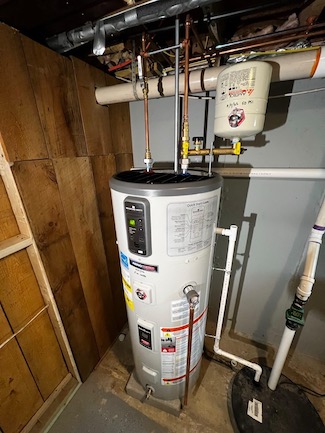 Social media also has played a huge role in the growth of McGillivary’s business. Starting as a small, part-time business with the help of word-of-mouth recommendations on small town Facebook pages, which made McGillivary realize that social media could be used to showcase the work he is doing on a day-to-day basis. “I use my Instagram to show what I am about as a business and the work I put out. I have found that if a customer can see why you are more expensive than the other guy, then they are more likely to go with you. I use it as an open-door insight to my business both in reels and daily stories,” says McGillivary.
Social media also has played a huge role in the growth of McGillivary’s business. Starting as a small, part-time business with the help of word-of-mouth recommendations on small town Facebook pages, which made McGillivary realize that social media could be used to showcase the work he is doing on a day-to-day basis. “I use my Instagram to show what I am about as a business and the work I put out. I have found that if a customer can see why you are more expensive than the other guy, then they are more likely to go with you. I use it as an open-door insight to my business both in reels and daily stories,” says McGillivary.
McGillivary uses social media to learn little tricks of the trade that he just wouldn’t have been exposed to, being from such a small town. For McGillivary, it is extremely beneficial to be able to have conversations with such great tradesmen. He also talks to apprentices daily or weekly about projects, and gives them advice. “I wish when I was learning, I had this platform to learn and meet others. As visual learners, much like a lot of trades guys I know, it’s changed the way we can learn,” says McGillivary.
Making Time
Summers in Maine are short, so McGillivary tries to spend every nice weekend camping in his camper. In the winter months you can find him on his snowmobile at camp. “I would love to ride my snowmobile from camp in northern Maine to the Gaspe Peninsula to complete the “Great Gaspe Snowmobile Tour,” a six-day, 1,500-mile ride around some of the best trails,” says McGillivary.
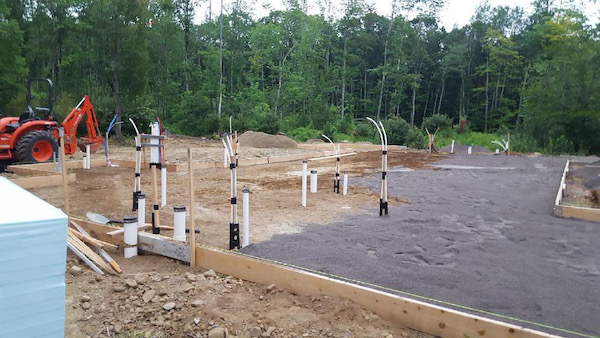
And the last day McGillivary said it was a great day? “You know it’s funny, as I look back on just yesterday—camping with my family, beautiful weather, everyone smiling, does it get much better than that? So, the answer to that question would be yesterday!”
Go-To Tools on the Job
According to McGillivary, his go-tools are a couple pairs of Knipex Cobra pump pliers, a 6-in-1 screwdriver, and an adjustable wrench. Any good service plumber can fix most things with those!
Also, I find myself feeling naked if I don’t have my Leatherman Wave on me. Another great tool that has many uses.
Lastly, if there was one tool that changed the service plumbing game, it’s the M12 Milwaukee press tool. If you’re running a service company and don’t have one, you’re late to the party.
